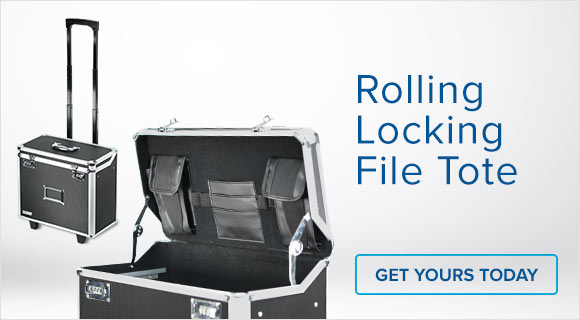
Updated 11-1-23. The Notary seal is critical for every notarization. Together with the Notary’s signature, the seal authenticates the notarization and makes the notarized document recordable in land records, admissible as evidence in legal proceedings and acceptable when sent to other states and countries. Thus, even in the few states that do not statutorily require the use of Notary seals, Notaries should always affix seal impressions when notarizing documents. This practice helps to strengthen the security of documents and helps to show evidence of due care by Notaries.
Hence, a fraudster would like nothing more than to obtain an authentic Notary seal to help in forging notarizations and carrying out document fraud.
We Notary educators talk a great deal about Notary seal security, and experienced Notaries have probably heard us many times before. But it’s worth repeating because Notary seals keep getting mishandled and stolen. Sometimes it’s because Notaries neglect to protect their seals, and sometimes it’s because an old seal was not disposed of properly. But whatever the reason, when criminals get their hands on a genuine Notary seal, forged notarizations are often the result. Whether you use a traditional physical seal or an electronic one, your seal must be protected against unauthorized access and misuse.
Recently a North Carolina lawyer took his legal assistant’s Notary seal from her unlocked desk while she was away from the office. This law-breaking attorney then forged a notarization by signing his assistant’s name and affixing her seal on a document, and then returning the seal to her desk — all without her knowledge. Unfortunately, there are other attorneys, employers and co-workers who try to cheat the Notary system by “borrowing” seals and engaging in this kind of misconduct. Unless you take steps to protect your seal, anyone — even a family member, friend, boss or co-worker — could take it and misuse it.
During World War II, information secrecy and security was important to Allied success. Spies used information picked up in casual conversations to help guide enemy attacks, so the public was often warned, “Loose lips sink ships.” Today, we are in a war against document fraud, so it is crucial to prevent false notarizations. So the mantra could be, “Loose Notary seals sink deals.” In other words, Notaries who carelessly allow their seals to be pilfered and misused may be liable for financial losses resulting from Notary tools carelessly mishandled or stolen.
Avoiding negligence
Too many Notaries leave their seals unattended around their work spaces, with no safeguards against unauthorized use or theft. In an Illinois case in which I testified as an expert witness, a Notary who worked in a busy office regularly left his Notary seal in an unlocked drawer of a desk that was shared by several co-workers. Lots of people could have taken the seal and used it to falsify notarizations.
If a Notary negligently allows their seal to be borrowed or stolen, or improperly gives away or sells an expired seal that is later used to forge notarizations, they are legally liable for any financial injuries resulting from the forgery. The key word in the liability rule is “negligently,” so here are some tips on how to protect yourself from liability.
Protecting your seal
First and foremost, always follow your state’s requirements, and use reasonable care to protect the security of the Notary seal. If you have taken precautions against theft of your seal, but a skillful fraudster still manages to take it, you are much less likely to be held liable than if you carelessly left it out in the open.
Remember, your seal belongs exclusively to you. Your name appears on its image. You should never allow anyone else to possess or even handle your seal. This is true even if your employer paid for the commission, and you leave the job before your Notary commission expires. Take your seal with you if you leave your employment, and continue to keep your seal secured.
Secure the seal at all times. When you are not using it (such as between notarizations), either keep it in your immediate possession or store it under lock and key under your exclusive control (in fact, this is required by law for California Notaries).
For instance, you might lock the seal in a desk drawer, file cabinet, safe, lockbox, or room — provided no one else has a key to the storage space. Simply leaving a seal on your desk in a locked office won’t protect the seal if someone else has a passkey for the office. In that circumstance, a court might perceive that you have not used reasonable care. You could be held liable if the seal is taken and used to commit document fraud which injures somebody.
If you travel to a notarization appointment, don’t leave the seal out in plain view in your vehicle where a potential thief might see it. Instead, lock the seal in the glove compartment, and be sure to lock the car too.
Incidentally, the same precautions apply when protecting your Notary journal. The seal and journal could and probably should be kept together; it is considered a best practice always to have both tools with you when performing a notarization.
Do not sell or give away current or expired seals
When you decide to stop being a Notary, or if your Notary commission expires, the old seal should be destroyed or defaced to render it unusable. Even an expired seal can be quite valuable to a fraudster who wants to backdate a document and forge a notarization. If you change jobs and will no longer serve as a Notary, do not leave your Notary seal behind with your former employer. It's your seal, and you have the legal duty to protect its security.
Unfortunately, current and expired Notary seals are often found at garage sales, thrift stores, flea markets, antique shops and through online sites. Never sell, give away or carelessly discard working seals. Here, too, you could be held liable for not exercising reasonable care to protect the security of an old seal, which was then used to commit fraud.
Conclusion — don’t let ‘loose seals sink deals’
Hopefully, I have said enough to scare you a little about potential liability to alert you to the importance of Notary seal security. But hopefully, I have also explained the basic precautions you can easily take to guard your seal from misuse and protect yourself from legal liability. The 2022 Model Notary Act (prepared and published by the NNA) includes Section 8-4 and its descriptive official comment, which set out the rules for protecting the Notary's traditional and/or electronic seal. And since I served on the drafting committee and helped to write the official commentary, the advice in this article is consistent with those MNA guidelines. Remember: Loose seals sink deals.


Related Articles:
Notarizing on the Job: What you and your boss need to know